In view of the EU’s climate neutrality goals, e-mobility and the development of e-charging infrastructure have become central policy priorities, increasingly attracting the attention of competition authorities. In her article published in the Austrian Journal of Competition Law (ÖZK), Teresa Greinecker explores how competition law shapes this emerging market. She examines whether oligopolies and collusion could impede the rollout of e-charging networks, whether competition law acts as a barrier or a catalyst for e-mobility, and how pricing and transparency affect market dynamics. Drawing on German and UK market studies, the article analyzes the Austrian e-charging market and highlights key differences from the fuel retail sector. It shows that ad-hoc charging promotes competition, while bundling may reduce price transparency. Although oligopoly formation and potential collusion have thus far been primarily observed in the fuel retail market, the findings indicate that such dynamics may also emerge in the e-charging infrastructure market. The article, which is based on Teresa’s bachelor thesis at The Competition Law Hub, is available here.
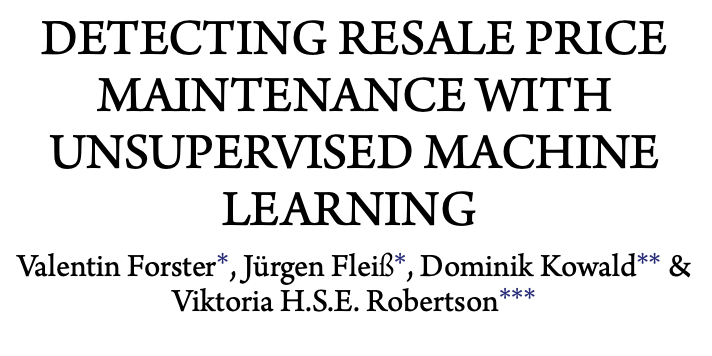
Detecting RPM with Unsupervised Machine Learning
Computational antitrust has found more and more applications in recent years, including through the use of machine learning. However, the availability of labelled data to train algorithms proves to be an obstacle. In this paper, Valentin Forster, Jürgen Fleiß, Dominik Kowald and Vicky Robertson explore the use of unsupervised machine learning to detect resale price maintenance (RPM) in price data. They develop assumptions that RPM prices exhibit increased similarity, a right-skewed distribution including a cut-off point, and fewer price changes over time compared with non-RPM prices. Based on these assumptions, they extract features based on simple statistical coefficients and perform clustering to detect products with price characteristics consistent with RPM. Subsequently, this can serve as a sufficient basis to conduct more in-depth antitrust investigations. They test our approach on five real-world product datasets scraped from an Austrian price comparison website. They show that their screen successfully clusters products with price patterns indicative of RPM. Their contribution, published in the Journal of Competition Law & Economics, is available in open access here.
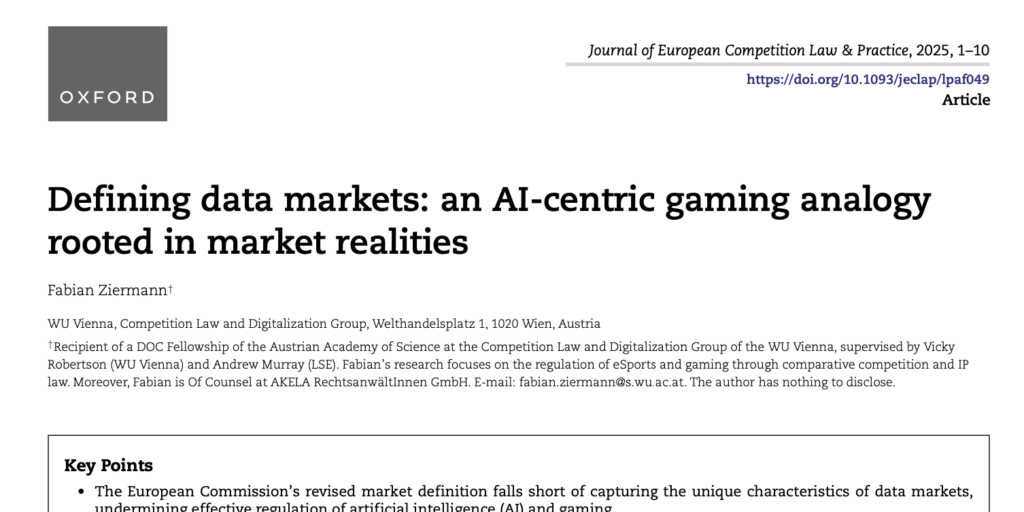
Data-driven market definition for AI and video games
In digital markets, the failure to adapt market definition tools risks undermining effective competition enforcement. In this open access contribution to the Journal of European Competition Law & Practice, Fabian Ziermann argues that defining markets in AI and video gaming must center on dataset substitutability. Using analogies from medicine, where cancer models cannot be trained on diabetes data, and gaming, where AI trained on one game mode fails in another, he illustrates why data markets should be delineated by dataset, not product.
Through case examples from Amazon, OpenAI, and Fortnite, he shows how this approach can address entrenched power in data-driven sectors. He further highlights that video games have long embodied AI-like structures, predating Big Tech’s dominance, and that competition authorities should treat AI and gaming as joint enforcement priorities. The article offers a concrete path forward for regulators seeking precision in defining digital markets shaped by algorithmic logic and data dependency, based on Amazon Marketplace. His contribution can be accessed here.
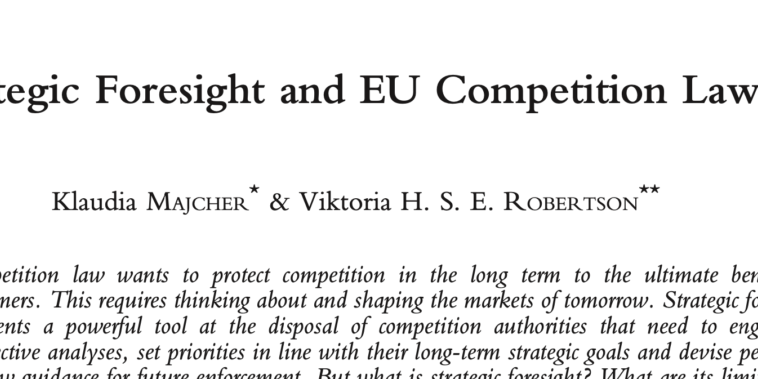
Strategic Foresight & Competition Law
Klaudia Majcher and Vicky Robertson’s paper on ‘Strategic Foresight and EU Competition Law’ was just published in World Competition. They discuss how tools from strategic foresight could contribute to making EU competition law more futureproof, while also highlighting the challenges that must be overcome to employ these tools. The article is available here.
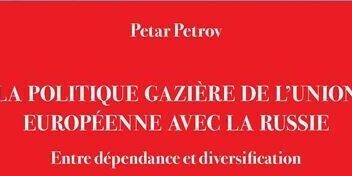
European Energy Policy
In a new book, Petar Petrov sheds light on the roots of Europe's energy dependence on Russia and the challenges it poses. He does so through a historical, geopolitical and competition law lens. He examines market dynamics, market structure, Gazprom's strategic role, and the growing tensions between energy security and European integration. This book also examines various challenges faced by the European Commission regarding efficient public enforcement in gas markets, with a particular focus on the Commission’s Gazprom decision, and points to the role of competition law in ensuring the functioning of the single gas market.

eSports and Antitrust Law
In a contribution to the edited volume Esports Law and Practice (Edward Elgar 2025), Soojin Nam, Vicky Robertson and Fabian Ziermann assess the state of play of antitrust in the eSports sector from the perspective of South Korean and EU competition law. The contribution can be accessed here.

Conceptualising Virtual Worlds
In a recent working paper, Ayse Gizem Yasar (LSE) and Fabian Ziermann explore the concept of virtual worlds. They argue that virtual worlds emerge from existing ecosystems, such as app stores, video games, and hardware platforms, and are shaped by competing narratives. Ultimately, virtual worlds’ structure will reflect the narratives advanced by the most influential stakeholders. To prevent a winner-takes-all outcome, as witnessed in other digital markets, they call for early regulatory involvement to help shape these evolving architectures. The paper can be accessed here.
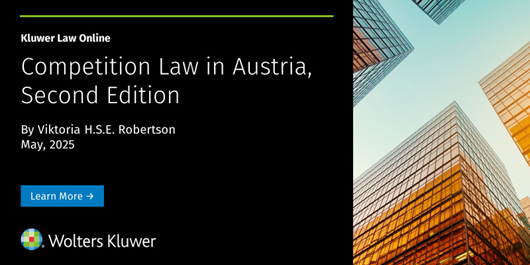
Competition Law in Austria 2025
Vicky Robertson just published the second edition of her monograph Competition Law in Austria. Forming part of Kluwer’s International Encyclopaedia of Laws, this volume provides an in-depth account of Austrian competition law, including its legal provisions and recent case law. The volume is up-to-date as of February 2025. It can be accessed here (as part of the IEL) and individually here.
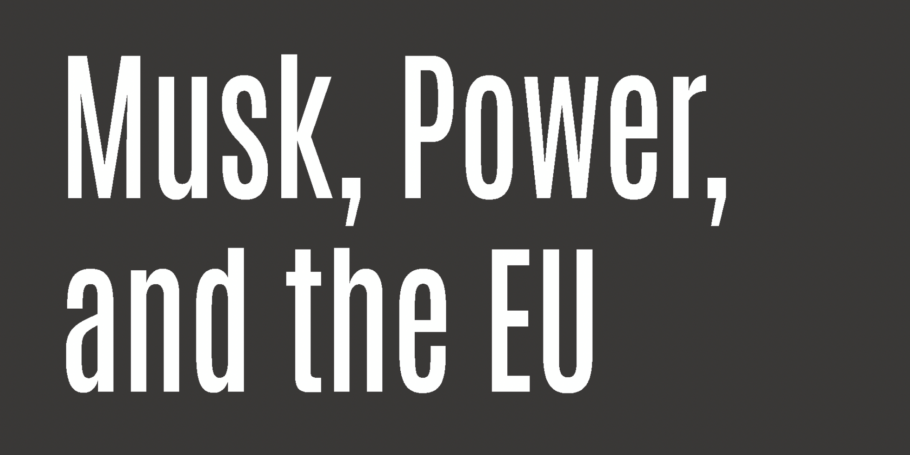
Protecting Democracy in the Digital Era
In a recent blog symposium on the Verfassungsblog that was turned into a Verfassungsbook, a range of scholars address the question how to deal with tech plutocracy in different areas of the law. Vicky Robertson contributed an essay on the possible contributions of competition law. Edited by Alberto Alemanno and Jack Veraldi, other authors include Anna Gerbrandy (who visited The Hub in May 2022) and Viktorija Morozovaite (who was a Visiting Fellow with The Hub back in 2022). The Verfassungsbook is available in open access here.

Algorithms as Antitrust Remedies
In digital markets, remedies are frequently seen as the weak point in EU competition law cases. In this contribution, Jana Lasser (Idea_Lab, University of Graz) and Vicky Robertson focus on one particular instrument that may be able to remedy certain competition concerns in digital platform markets: alternative recommendation algorithms. Through four scenarios, they explore how alternative recommendation algorithms could remedy competition concerns that arise in relation to the quality of digital services, media pluralism, and weak competition in social media and digital news markets. They assess both the design and the monitoring of this complex type of remedy by competition authorities. Their contribution in the Journal of European Competition Law and Practice is available in open access.

The DMA in Bulgaria
Petar Petrov contributed a chapter on the application of the Digital Markets Act (DMA) in Bulgaria to the book Navigating the DMA: Application Across National Jurisdictions, edited by Gabriella Muscolo and Alessandro Massolo, and published by Concurrences. The book was presented on 26 February 2025 in Paris on the occasion of the annual OECD Competition Law Days conference. You can access the chapter here.

Detecting RPM with Unsupervised Machine Learning
The data-driven investigation of potential antitrust violations has found more and more applications in recent years, including through the use of machine learning. However, the availability of labelled data to train algorithms proves to be an obstacle. In a new working paper, Valentin Forster, Jürgen Fleiß, Dominik Kowald and Vicky Robertson explore the use of unsupervised machine learning to detect Resale Price Maintenance (RPM) in price data. Their paper is available here.
